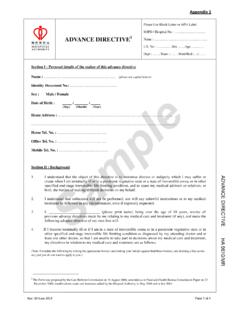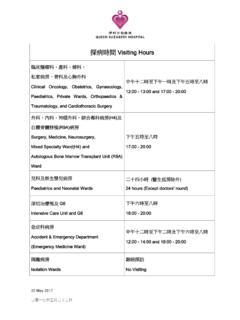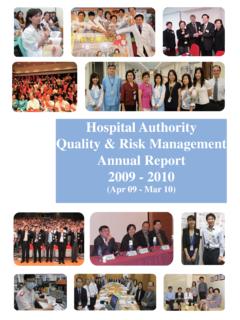Transcription of Sample Code of Conduct - Hospital Authority
1 Sample code of Conduct Ethical Commitment 1. The (name of company) (hereafter referred to as the Company) regards honesty, integrity and fair play as our core values that must be upheld by all directors and staff1 of the Company at all times. This code sets out the basic standard of Conduct expected of all directors and staff, and the Company s policy on acceptance of advantage and handling of conflict of interest when dealing with the Company s business. Prevention of Bribery 2. The Company prohibits all forms of bribery and corruption. All directors and staff are prohibited from soliciting, accepting or offering any bribe in conducting the Company s business or affairs, whether in Hong Kong or elsewhere. In conducting all business or affairs of the Company, they must comply with the Prevention of Bribery Ordinance (POBO) of Hong Kong and must not: (a) solicit or accept any advantage from others as a reward for or inducement to doing any act or showing favour in relation to the Company s business or affairs, or offer any advantage to an agent of another as a reward for or inducement to doing any act or showing favour in relation to his principal s business or affairs; (b) offer any advantage to any public servant (incl.)
2 Government / public body employee) as a reward for or inducement to his performing any act in his official capacity or his showing any favour or providing any assistance in business dealing with the Government / a public body; or (c) offer any advantage to any staff of a Government department or public body while they are having business dealing with the latter. (The relevant provisions of the POBO are at Annex 1.) Acceptance of Advantage 3. It is the Company s policy that directors and staff should not solicit or accept any advantage for themselves or others, from any person, company or organization having business dealings with the Company or any subordinate, except that they may accept (but not solicit) the following when offered on a voluntary basis: (a) advertising or promotional gifts or souvenirs of a nominal value; or (b) gifts given on festive or special occasions, subject to a maximum limit of $_____ in value; or 1 Staff cover full-time, part-time and temporary staff, except where specified.
3 - 2 - (c) discounts or other special offers given by any person or company to them as customers, on terms and conditions equally applicable to other customers in general. 4. Gifts or souvenirs described in paragraph 3(a) that are presented to directors and staff in official functions are deemed as offers to the Company. The directors and staff concerned should report the acceptance to the Company and seek direction as to how to handle the gifts or souvenirs from the approving authority2 using Form A (Annex 2). If a director or staff member wishes to accept any advantage not covered in paragraph 3, he/she should also seek permission from the approving Authority using Form A. 5. However, a director or staff member should decline an offer of advantage if acceptance could affect his/her objectivity in conducting the Company s business or induce him/her to act against the interest of the Company, or acceptance will likely lead to perception or allegation of impropriety.
4 6. If a director or staff member has to act on behalf of a client in the course of carrying out the Company s business, he/she should also comply with any additional restrictions on acceptance of advantage that may be set by the client ( directors and staff members performing any duties under a government or public body contract will normally be prohibited from accepting advantages in relation to that contract). Offer of Advantage 7. Directors and staff are prohibited from offering advantages to any director, staff member or agent of another company or organization, for the purpose of influencing such person in any dealing, or any public official, whether directly or indirectly through a third party, when conducting the Company s business. Even when an offer of advantage carries no intention of improper influence, it should be ascertained that the intended recipient is permitted by his employer/principal to accept it under the relevant circumstance before the advantage is offered.
5 Entertainment 8. Although entertainment3 is an acceptable form of business and social behaviour, a director or staff member should avoid accepting lavish or frequent entertainment from persons with whom the Company has business dealing ( suppliers or contractors) or from his/her subordinates to avoid placing himself/herself in a position of obligation. Records, Accounts and Other Documents 9. Directors and staff should ensure that all records, receipts, accounts or other documents they submit to the Company give a true representation of the facts, events or business transactions as shown in the documents. Intentional use of documents 2 Specify the post of the approving Authority in the code and the Form. 3 Entertainment refers to entertainment as defined in the POBO, food or drink provided for immediate consumption on the occasion, and any other entertainment provided at the same time.
6 - 3 - containing false information to deceive or mislead the Company, regardless of whether there is any gain or advantage involved, may constitute an offence under the POBO. Compliance with Laws of Hong Kong and in Other Jurisdictions 10. Directors or staff must comply with all local laws and regulations when conducting the Company s business, and also those in other jurisdictions when conducting business there4 or where applicable5. Conflict of Interest 11. Directors and staff should avoid any conflict of interest situation ( situation where their private interest conflicts with the interest of the Company) or the perception of such conflicts. When actual or potential conflict of interest arises, the director or staff member should make a declaration to the approving Authority through the reporting channel using Form B (Annex 3). 12. Some common examples of conflict of interest are described below but they are by no means exhaustive: (a) A staff member involved in a procurement exercise is closely related to or has financial interest in the business of a supplier who is being considered for selection by the Company.
7 (b) One of the candidates under consideration in a recruitment or promotion exercise is a family member, a relative or a close personal friend of the staff member involved in the process. (c) A director of the Company has financial interest in a company whose quotation or tender is under consideration by the Board. (d) A staff member (full-time or part-time) undertaking part-time work with a contractor whom he is responsible for monitoring. Misuse of Official Position, Company Assets and Information 13. Directors and staff must not misuse their official position in the Company to pursue their own private interests, which include both financial and personal interests and those of their family members, relatives or close personal friends. 4 The Integrity and Compliance with the Law : a guide to the prevention of corruption for SME entrepreneurs investing in Guangdong and Hong Kong jointly published by the ICAC and the Guangdong Provincial People s Procuratorate provides guidance on the anti-bribery laws in Mainland China and Hong Kong.
8 Directors and staff conducting the Company s business there may find it helpful. 5 Some other countries anti-bribery laws have provisions with extra-territorial effect, the UK s Bribery Act 2010, the USA s Foreign Corrupt Practices Act. - 4 - 14. Directors and staff in charge of or having access to any Company assets, including funds, property, information, and intellectual property, should use them solely for the purpose of conducting the Company s business. Unauthorized use, such as misuse for personal interest, is strictly prohibited. 15. Directors and staff should not disclose any classified information of the Company without authorization or misuse any Company information ( unauthorized sale of the information). Those who have access to or are in control of such information, including information in the Company s computer system, should protect the information from unauthorized disclosure or misuse.
9 Special care should also be taken in the use of any personal data, including directors , staff s and customers personal data, to ensure compliance with Hong Kong s Personal Data (Privacy) Ordinance. Outside Employment 16. If a staff member wishes to take up employment outside the Company, he must seek the prior written approval of the approving Authority . The approving Authority should consider whether the outside employment would give rise to a conflict of interest with the staff member s duties in the Company or the interest of the Company. Relationship with Suppliers, Contractors and Customers Gambling 17. Directors and staff are advised not to engage in frequent gambling activities ( mahjong) with persons having business dealings with the Company. Loans 18. Directors and staff should not accept any loan from, or through the assistance of, any individual or organization having business dealings with the Company.
10 There is however no restriction on borrowing from licensed banks or financial institutions. [The Company may wish to include other guidelines on the Conduct required of directors and staff in their dealings with suppliers, contractors, customers, and other business partners as appropriate to specific trades.] Compliance with the code 19. It is the responsibility of every director and staff member of the Company to understand and comply with this code , whether performing his duties of the Company in or outside Hong Kong. Managers and supervisors should also ensure that the staff under their supervision understand well and comply with this code . - 5 - 20. Any director or staff member in breach of this code will be subject to disciplinary action, including termination of appointment. Any enquiries about this code or reports of possible breaches of this code should be made to (post of a designated senior staff member).









